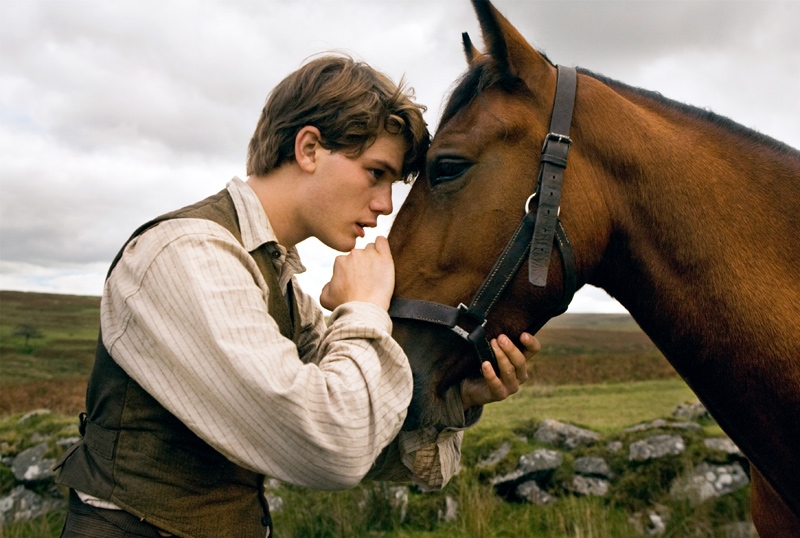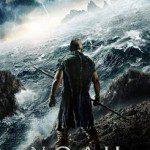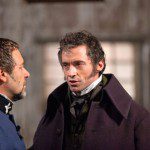War Horse is not a postmodern film. Steven Spielberg’s latest offering does not aim for the stylish irony of a Quentin Tarantino film, the melancholic psycho-spirituality of Darren Aronofsky, the stylized editing of David Fincher, the staggering reversals of M. Night Shyamalan or powerful complexity of Christopher Nolan’s multi-layered masterpieces. I’ll publish a review of War Horse on Friday (it opens on Christmas day), but what interests me at the moment is the way in which Spielberg uses modern (and not postmodern) filmmaking to tell the story of the end of modernity: World War 1.
 As anyone knows who’s read the Michael Morpurgo children’s novel (1982) or seen the play (2007), War Horse tells the tale of Joey, a horse of remarkable strength and pluck who journeys from the great open vistas of England’s southwestern county of Devon, through the cities and countryside of Europe in the midst of World War 1, and eventually back into the arms of the boy (Albert, played by newcomer Jeremy Irvine) who tamed him and built his life around him. Albert’s father purchased Joey in a fit of pique at his exploitative landlord, and it’s only through Albert’s interventions that Joey indeed turns around the family fortunes. Yet Albert’s beloved friend is sold to the military at the outset of World War 1, and goes into war as the mount of a young captain (played by the Oxford- and Cambridge-bred Tom Hiddleston, a rising star who has recently played Loki in Thor and F. Scott Fitzgerald in Midnight in Paris). I won’t reveal the twists and turns of the plot from there, but Joey ends up trapped in No Man’s Land between the British and German trenches, and becomes the occasion for a momentary outbreak of peace as men from both sides struggle to free him.
As anyone knows who’s read the Michael Morpurgo children’s novel (1982) or seen the play (2007), War Horse tells the tale of Joey, a horse of remarkable strength and pluck who journeys from the great open vistas of England’s southwestern county of Devon, through the cities and countryside of Europe in the midst of World War 1, and eventually back into the arms of the boy (Albert, played by newcomer Jeremy Irvine) who tamed him and built his life around him. Albert’s father purchased Joey in a fit of pique at his exploitative landlord, and it’s only through Albert’s interventions that Joey indeed turns around the family fortunes. Yet Albert’s beloved friend is sold to the military at the outset of World War 1, and goes into war as the mount of a young captain (played by the Oxford- and Cambridge-bred Tom Hiddleston, a rising star who has recently played Loki in Thor and F. Scott Fitzgerald in Midnight in Paris). I won’t reveal the twists and turns of the plot from there, but Joey ends up trapped in No Man’s Land between the British and German trenches, and becomes the occasion for a momentary outbreak of peace as men from both sides struggle to free him.
Spielberg himself told us at the press junket that this is not an anti-war movie. Moments earlier, Emily Watson (who plays Albert’s mother, Rose Naracott) had said that it was an anti-war movie. Morpurgo has said that War Horse is not about war but about peace, as the horse is no respecter of sides (he finds himself serving both the Allies and the Central Powers) and brings about peace wherever he goes. There’s no question that Spielberg shows the horrors of war — though less graphically here than in Saving Private Ryan. And the horse is a useful lens. Somewhere between 5 and 10 million horses died in the Great War, as the mechanization of warfare made horses little more than machine-gun fodder and beasts of burden who worked to death pulling massive pieces of artillery around the continent.
We remember World War 1 as a particularly pointless war. Archduke Ferdinand of Austria, heir to the Austrio-Hungarian Empire, was assassinated by a Yugoslav nationalist, and this led to a conflict that conspired, through alliances forged in the previous decades, to put the world’s greatest imperialist powers at war against one another. The “cause” of the war was essentially the relentless expansion of Europe’s imperial powers, and the war erupted when their claims to portions of the world came in conflict.
None of this is shown in the film. Instead we see the sons of England rushing to enlist for the next great adventure, expecting a swift and orderly conflict that would allow them to travel and train and exercise their masculinity. Instead they found themselves mired in a years-long nightmare, and a whole generation was decimated, as the old methods of warfare (like the cavalry charge) ran directly into the new technologies of war, and the result was wholesale slaughter with a swiftness and bullet-filled brutality that the world had never before seen. In the seventeenth century, it took thirty years to kill 4-11 million Europeans. In World War 1, it took 4 years to kill 15-20 million (as many as 65 million if one includes deaths due to the Spanish Flu, which spread through the war).
Moviegoers will find that War Horse reminds them of the best movies they saw when they were growing up. Its story is complicated insofar as it takes the audience through multiple smaller stories in sequence, but it’s a single story line told in a chronological manner. There’s no shifting back and forth in time (as in Pulp Fiction), no backward storytelling (as in Memento), no multi-layered temporal puzzles (as in Inception). There’s also no sardonic narrator (as in Fight Club), no multiplicity of interlocking stories (a la Crash), no clever insertions of text (as in a Guy Ritchie flick) — none of the gimmicks. It’s straightforward storytelling in the midst of gorgeous wide-angle views of the English and French countrysides from a master of the craft who feels no need to attract attention to himself. As uber-producer Kathleen Kennedy told me, it’s the kind of “epic story of hope” that attracted her to movies, a story of family and love and bravery and loyalty that’s cast upon the widest and most dramatic canvas possible.
Philosophers and theologians often cite World War 1 as the end of “the modern era,” a period of optimism in the progress of science and the perfectibility of human nature and society. The “progressives” of the eighteenth and nineteenth centuries believed — with much justification — that the irresistible march of scientific knowledge would offer not only mastery of the physical world but also mastery of the psychological and social worlds. We were extricating ourselves from the backwardness and the superstitions of the pre-modern world (the achievements and the philosophical and scientific syntheses of the “Dark Ages” prior to the “Enlightenment” were conveniently forgotten), and were forging a new world order, spreading the light of knowledge (and therefore peace and joy) through Europe’s far-flung colonies around the globe.
World War 1 shattered that belief. It was the most scientifically developed nations, and the most politically developed ones as well, that fought each other until they were savagely red in tooth and claw. In the Great War, science was the great leveler, the machine that mowed down a generation and cared nothing for title and rank. Europe staggered out of World War 1 far less confident in its own virtue, and far less confident that the world was growing brighter with every passing decade.
America, largely untouched by World War 1, would cherish its visions of progress for decades longer, even through World War 2. Europeans view Americans as naive in this respect, blinkered, hopelessly optimistic in the face of human evil. Perhaps the persistence of Christian faith in America has had something to do with that peculiarly American sense of optimism and hope — but World War 1 and the complicity of the state churches (as in World War 2) accelerated the eclipse of Christianity in Europe.
Spielberg tells a classical odyssey story in a classical manner. He tells a story of hope in the midst of the war that, for an entire continent, sounded the death knell of hope. It will be interesting to see how American audiences respond. Will this story seem anachronistic, like a John Ford or David Lean movie, or will it remind Americans why they fell in love with movies in the first place? Will they conclude that Steven Spielberg has fallen behind the wave of more ironic, self-referential, pessimistic filmmakers? Or will they remember why they, as Americans, have resonated especially with this can-do filmmaker who loves stories of adventure and hope?











